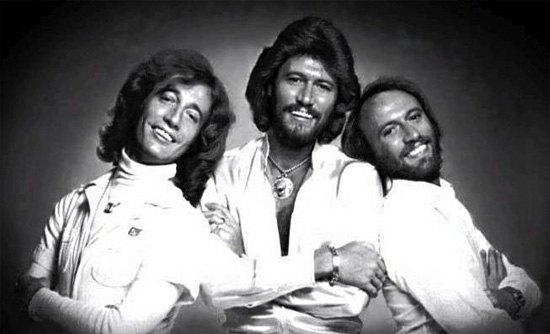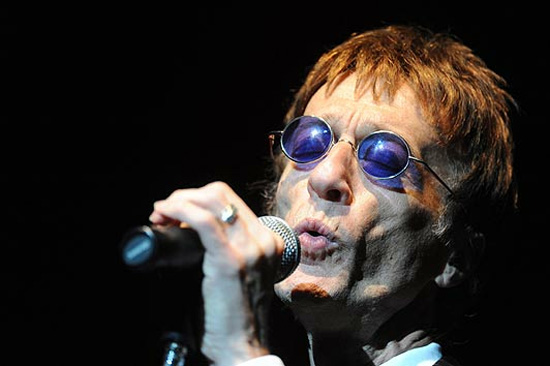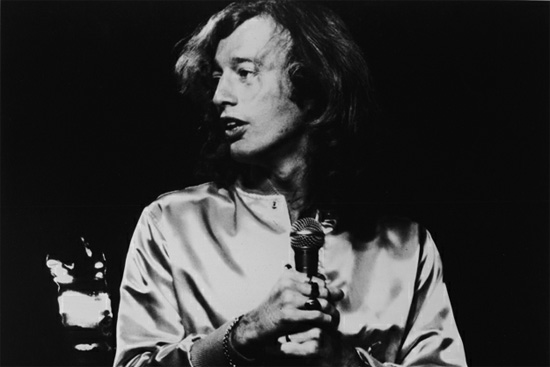"Robin Gibb: disco pioneer". That’s what you’ll get in most obits of Robin Gibb, because obituaries are built on two word generalisations. But much as it’s undeniably true, it also understates his importance to the wider world of modern pop music. Because beyond his contributions to the disco canon, Robin Gibb was also one of the driving forces behind a band that stands up there alongside The Beatles, The Rolling Stones and Abba in the celestial chamber of hit creating mega-bands.
The Bee Gees were so good it almost hurts to contemplate their brilliance. Now that’s gone. And it’s not tragic or any of those glib words, it’s sad and sorry, but gives us the impetus to look at how goddamn good those records were, and to remember that the Bee Gees were kicking it long before Travolta pulled on the white suit and strapped on the platforms.
The Bee Gees belong to Britain, whatever Australia might try to tell you. The Gibb brothers were born on the Isle of Man to English parents and hopped off to Australia in the late-50s as their ‘rents searched for a better life away from British austerity (sound familiar?). The brothers quickly became a band and returned to Britain in the wake of chart success for their 12th single ‘Spicks And Specks’.
After hooking up with legendary producer and impresario Robert Stigwood, the hits began with their first No.1 single in 1967, the eternally great ‘Massachusetts’ (it also hit No.11 in the US). That was followed by a No.7 with ‘World’ and a string of hits in 1968 including ‘Words’ (later butchered by Boyzone). Among Robin Gibb’s many brilliant tunes during that period, ‘I Started A Joke’ stands out for its brilliant origin story. He explained:
"The melody… was heard aboard a British Airways Vickers Viscount about a hundred miles from Essen. It was one of those old four engine ‘prop’ jobs that seemed to drone the passenger into a sort of hypnotic trance, only with this it was different. The droning, after a while, appeared to take the form of a tune, which mysteriously sounded like a church choir. So it was decided! We accosted the pilot, forced him to land in the nearest village and there, in a small pub, we finished the lyrics. Actually, it wasn’t a village, it was the city and it wasn’t a pub, it was a hotel and we didn’t force the pilot to land in a field…but why ruin a perfectly good story?"

Blood may be thicker than water, but jealousy frequently floats on top of blood like oil. By 1969 the Bee Gees were in crisis, with Robin convinced that Stigwood was pushing Barry as the group’s frontman. The next record, Odessa, was a critical success, but its only single ‘First Of May’ was only a minor hit and Robin felt stung that the flip side ‘Lamplight’ had not been the track given the big push.
Tensions high, Robin quit the band and launched a solo career with Robin’s Reign, an album of strong material that suffered from the lack of the brothers’ tight harmonies but gave him some success with No. 2 hit ‘Saved By The Bell’. Maurice and Barry kept on trucking, roping in their sister Lesley to flesh out the diminished Bee Gees line up as it limped through Europe.
The separation was not to last long. The brothers were back together by late 1970 and utterly obsessed with loneliness, penning a string of heartbreaking songs such as ‘Lonely Days’, ‘Run To Me’ and ‘My World’. While there is strong material from this period, it was definitely a creative low point for the group, and they needed something to fire them back into the public consciousness. That something proved to be spelled D.I.S.C.O.
After prompting from Eric Clapton of all people, the Gibb brothers relocated to Miami in early 1975 to record a new record. The ballads were binned for new rhythmic disco songs, including the group’s second US No.1 ‘Jive Talkin’. New album Main Course raced up the charts and finally gave them real traction in America.
Barry had discovered his falsetto chops, and his brothers followed with synth licks slathered all over their new material. Following album Children Of The World produced ‘You Should Be Dancing’ and propelled the Bee Gees to the next level of fame. They were now far more of a rock band, with slicing rhythm guitar and tight drums behind all that synth and falsetto.
The fame was soon to increase exponentially, as the Bee Gees were encouraged by Stigwood to provide songs for the Saturday Night Fever soundtrack. At first, the movie featured no one moment of their involvement, but by the time post-production was underway, the connection was symbiotic. Saturday Night Fever was the Bee Gees, and the Bee Gees were Saturday Night Fever.
A trio of Bee Gees singles topped the charts worldwide – ‘How Deep Is Your Love?’, ‘Stayin’ Alive’ and ‘Night Fever’ – kicking disco into its most commercially profitable era. The band also penned ‘If I Can’t Have You’ for Yvonne Elliman, and were so popular that two different versions of ‘More Than A Woman’ became radio mainstays. By Christmas 1977, six songs by the Brothers Gibb had held the No.1 position in the US charts for 25 consecutive weeks – three Bee Gees releases, two solo hits for brother Andy and the Elliman take on ‘If I Can’t Have You’.
During this imperial period, Barry and Robin also knocked out ‘Emotion’ for their friend Samantha Sang. It became a top 10 hit. Barry also wrote the title song for the Broadway production of Grease. The Bee Gees were enjoying the kind of chart dominance only previously experienced by The Beatles in their pomp. Appropriately, they then popped up co-starring with Peter Frampton in the Sgt Pepper’s Lonely Hearts Club Band movie. Sadly the soundtrack to that odd film was a huge flop, a desperate comedown following Night Fever‘s panzer attack on the pop charts.
However, the Bee Gees’ follow-up to Saturday Night Fever was far more positive. Spirits Having Flown featured three more No.1 hits, ‘Too Much Heaven’, ‘Tragedy’ (later demolished by Steps) and ‘Love You Inside Out’. ‘Too Much Heaven’ became the Bee Gees’ contribution to 1979’s Music For UNICEF Concert, and the band has contributed in excess of £10m to the charity through its royalties alone.
With so much success, a backlash was inevitable. By 1979, disco was on the wane and radio stations began promoting Bee Gee Free weekends. The Bee Gees continued to sell steadily, but the phase of their greatest pomp was over.

Through the 80s, Robin released a series of moderately successful solo albums, but possibly his loveliest solo engagement was 1978’s appearance on Sesame Street, where he serenaded Oscar The Grouch with a song called ‘Trash’. With Barry, Robin worked on Barbra Streisand’s Guilty, scoring her a No.1 hit with ‘Woman In Love’ and making it her most successful single and album up to that point. The team brought the same success to Dionne Warwick, Dolly Parton and Kenny Rogers. The disco magic was recaptured again in 1983 with the soundtrack to Staying Alive, the sequel to Saturday Night Fever.
The brothers continued to tour successfully throughout the 80s and 90s, staging a massive ‘final’ concert to celebrate the millennium. After Maurice’s death in 2003, the band went on hiatus. In 2004, Robin embarked upon a solo tour of Germany, Russia and much of Asia before reuniting with Barry and a collection of stars in 2005 to record a record to benefit the Disasters Emergency Committee.
The brothers performed together again in 2009 on Strictly Come Dancing and its US cousin Dancing With The Stars. Their next public appearance was to induct fellow hit machine ABBA into the Rock And Roll Hall Of Fame in March 2010. Later that year, Robin told the Daily Mail that Steven Spielberg has optioned the group’s story.
The sad news of Robin’s illness was announced in November 2011 when he was just 61 years old. In February this year, he appeared in public with a trio of British service people for the Coming Home charity concert. He was a long time supporter of armed forces charities, and campaigned for Bomber Command to receive recognition for its efforts during World War 2.
On April 14, reports surfaced that Robin was fighting for his life. Positive signs were seen on 20 April, when he was reported to have come out his coma, but sadly it was a false dawn. Robin Gibb died on 20 May 2012, leaving Barry Gibb as the sole remaining member of the Bee Gees.
Robin Gibb did many things beyond writing hit records, but they stand as an incredible testament to his ability as an artist. In 1997, when the Bee Gees were inducted into the Rock And Roll Hall Of Fame, the presenter was Brian Wilson. He called the group: "Britain’s first family of harmony" and the citation on their award says: "Only Elvis Presley, The Beatles, Michael Jackson, Garth Brooks and Paul McCartney have outsold the Bee Gees."
Goodbye Robin. You were brilliant.


